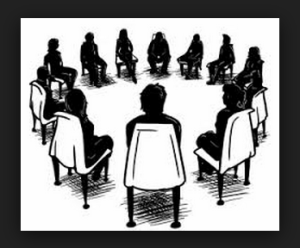 Shortly after getting off the plane in San Francisco last week, I went to my first AA meeting. A friend invited me to tag along to the gathering where she’s been a regular for years. It was an open meeting — meaning visitors were welcome — and my friend had been asked to tell her story as the evening’s guest speaker.
Shortly after getting off the plane in San Francisco last week, I went to my first AA meeting. A friend invited me to tag along to the gathering where she’s been a regular for years. It was an open meeting — meaning visitors were welcome — and my friend had been asked to tell her story as the evening’s guest speaker.
In many ways, the ragtag assembly of a few dozen folks in a nondescript storefront reminded me of our twice-monthly house meetings at BHFH. Both begin with a moment of silence. Both follow clearly prescribed (and time-limited) procedures for sharing personal stories and conducting business. Both are closely aligned to the values of their sponsoring organizations — Alcoholics Anonymous and the Religious Society of Friends (Quakers). Both organizations refer to their Meetings in ways that suggest an upper case M.
I expected to learn some new things about my friend at the AA meeting, and I did. What surprised me was learning something about the topic that occasioned our trip to the west coast in the first place.
As Carol noted in a post last week, she’s been doing lots of reading lately about generosity, the focus of the retreat that she helped lead last weekend. The question we’ve both been wrestling with is simple enough in the framing: How much is enough?
How do we know where to draw the line between prudent financial planning, for example, and fearful hoarding against medical catastrophe? It’s the sort of long-term quandary that can cripple decisive action in the meantime.
The AA meeting and house meetings at BHFH, on the other hand, present immediate opportunities to be generous.
Service is a guiding principle in AA — one member helping another. And not necessarily in a way you might expect. Cross-talk — the pattern of one person commenting about what someone else has said — is banned. If anyone simply can’t resist the urge to offer counsel, the secretary of the meeting is empowered to interrupt with a one-word reminder, “format.”
Advice, in other words, is not to be confused with service. Instead, AA members find support by listening to one another’s own stories. What a concept — generosity as listening! There’s plenty of time after the meeting for one-on-one conversations and the exchange of ideas and tips that work.
At BHFH meetings, the “talking rock” tradition encourages people to share what’s going on in their lives in two minutes or less. The task of the 20 other people in the room is not to comment on anything they hear, but simply to listen. As with AA, there’s plenty of time to follow up later, after the meeting, as appropriate.
At the retreat run by Carol and her friend, Tom, someone in my small group suggested the idea of thinking about generosity not in financial terms but as a “disposition” toward the world — and people — around us.
Several people suggested “generous driving” as an example of the sort of disposition that might be desireable. I consider myself a fairly generous driver — I usually accommodate the lane-changers — but I’m a pretty aggressive pedestrian. Maybe it wouldn’t kill me to show a little generosity toward those drivers in a hurry who fail to stop for me in the crosswalk on Beacon when I’m headed into the Common.
All this talk about generosity doesn’t resolve the larger question of how much is enough. But it makes a start on a smaller one: What’s my next opportunity to be generous — by listening, by easing up on my righteous indignation, by paying attention to what someone else actually needs?
For now, maybe that’s enough.

Both of you were beautifully and bountifully generous to us last week when we visited you. Lunch, listening, questioning even walking us to the Common and all the way back to our car — being present. Being curious. Being cheerful.